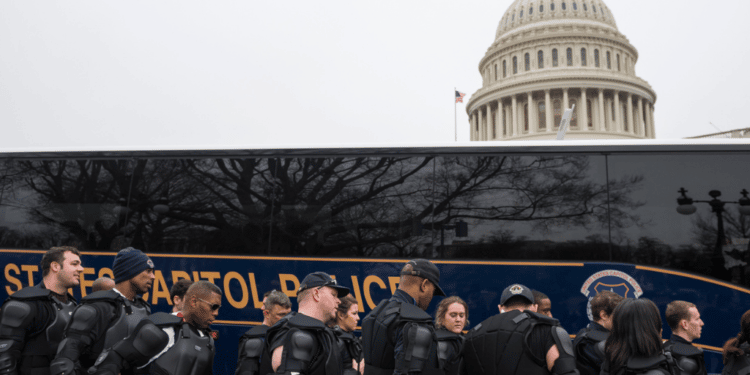Retired Capitol Police Lieutenant Sharon Blackmon-Malloy recently told ProRepublica that she wasn’t surprised that a pro-Trump riot was able to breach the Capitol building. Blackmon-Malloy, Vice President of the U.S. Capitol Black Police Association and lead plaintiff in the 2001 class action lawsuit against the Capitol Police Board, continued, saying “We got Jan. 6 because no one took us seriously.” Blackmon-Mallory retired in 2007 and has been working tirelessly to reform the Capitol Police since then.
Other Black officers of the Capitol Police Force have stepped forward to suggest that Capitol Police officers sympathized with the mob that broke into the Capitol on January 6, to comment on the racism they’ve experienced for decades in the force. The Capitol Police have a long and well-documented history with allegations of racism and discrimination, with numerous class action lawsuits filed against them for “continuous, pervasive and egregiously discriminatory actions” according to a 2012 suit.
Two current Capitol Police officers echoed Blackmon-Mallory’s comments in anonymous interviews with Buzzfeed News. One of the officers spoke about his dismay when he spotted some of his white colleagues taking selfies with the rioters. “That one hurt me the most because I was on the other side of the Capitol getting my ass kicked.” The officer says he saw colleagues fraternizing with rioters openly carrying white supremacist paraphernalia. “There’s quite a big difference when the Black Lives Matter protests come up to the Capitol,” he said. “[On Wednesday], some officers were catering to the rioters.” Both interviewees commented on the different treatment white and non-white protestors received from the Capitol Police.
As the Capitol Police fall under the direct jurisdiction of Congress and do not have an intermediary watchdog organization to supervise their conduct, Congress is responsible for reforming and managing the force. Rep. Tim Ryan, D-OH, the chair of the subcommittee in charge of investigating the January 6 riot, announced on January 12 that 12 members of the Capitol Police force are under investigation for their conduct during the riot, and 2 officers have been suspended.
Jacob Chansley, depicted in viral images from the Senate floor, claimed that Capitol Police let him into the building on January 6. Only weeks before, on December 12, Chansley was spotted with a large spear outside the capitol by two women who reported him to the Capitol Police. According to the ProRepublica article, “[The women] alerted the Capitol Police at the time, as the spear seemed to violate the complex’s weapons ban, but officers dismissed their concern, they said. One officer told them that Chansley had been stopped earlier in the day, but that police “higher ups” had decided not to do anything about him.”
At the core of the complaints from current and former Capitol Police whistleblowers are allegations of race-based discrimination and harassment on the force that officers say has contributed to the Capitol Police’s failure to properly execute their duties in a non-discriminatory manner. For example, it has been widely recognized that the Capitol Police’s reaction to a June 1 Black Lives Matter (BLM) protest outside of the Capitol was far more forceful than the widely critiqued lack of response to the Jan 6 demonstration that eventually turned into a riot. During the June 1 demonstration, National Guard troops were deployed to clear the area in front of the Capitol, while on January 6, National Guard troops were not activated until the protesters had already breached the Capitol. In a recent interview, D.C. Attorney General Karl Racine commented on the scale of Capitol Police preparation for the BLM protest, saying that there was a “presumption that folks who were protesting racial justice were dangerous. I can only guess what would have happened if on June 1 there was a breach at the Capitol. Kent State maybe?”
In light of these glaring disparities, it is easy to see how heeding whistleblower warnings about pervasive racism might have helped the Capitol Police force properly respond to and prevent the riots on January 6. Individuals that blow the whistle from within police forces take huge risks to protect the general public from corrupt practices.


